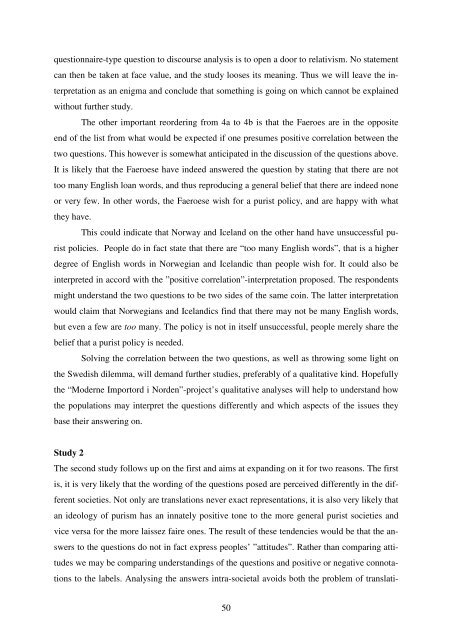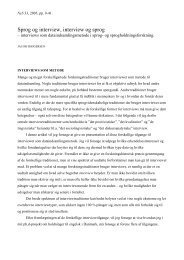Hør dog hvad de siger - Note-to-Self: Trials & Errors
Hør dog hvad de siger - Note-to-Self: Trials & Errors
Hør dog hvad de siger - Note-to-Self: Trials & Errors
Create successful ePaper yourself
Turn your PDF publications into a flip-book with our unique Google optimized e-Paper software.
questionnaire-type question <strong>to</strong> discourse analysis is <strong>to</strong> open a door <strong>to</strong> relativism. No statement<br />
can then be taken at face value, and the study looses its meaning. Thus we will leave the in-<br />
terpretation as an enigma and conclu<strong>de</strong> that something is going on which cannot be explained<br />
without further study.<br />
The other important reor<strong>de</strong>ring from 4a <strong>to</strong> 4b is that the Faeroes are in the opposite<br />
end of the list from what would be expected if one presumes positive correlation between the<br />
two questions. This however is somewhat anticipated in the discussion of the questions above.<br />
It is likely that the Faeroese have in<strong>de</strong>ed answered the question by stating that there are not<br />
<strong>to</strong>o many English loan words, and thus reproducing a general belief that there are in<strong>de</strong>ed none<br />
or very few. In other words, the Faeroese wish for a purist policy, and are happy with what<br />
they have.<br />
This could indicate that Norway and Iceland on the other hand have unsuccessful pu-<br />
rist policies. People do in fact state that there are “<strong>to</strong>o many English words”, that is a higher<br />
<strong>de</strong>gree of English words in Norwegian and Icelandic than people wish for. It could also be<br />
interpreted in accord with the ”positive correlation”-interpretation proposed. The respon<strong>de</strong>nts<br />
might un<strong>de</strong>rstand the two questions <strong>to</strong> be two si<strong>de</strong>s of the same coin. The latter interpretation<br />
would claim that Norwegians and Icelandics find that there may not be many English words,<br />
but even a few are <strong>to</strong>o many. The policy is not in itself unsuccessful, people merely share the<br />
belief that a purist policy is nee<strong>de</strong>d.<br />
Solving the correlation between the two questions, as well as throwing some light on<br />
the Swedish dilemma, will <strong>de</strong>mand further studies, preferably of a qualitative kind. Hopefully<br />
the “Mo<strong>de</strong>rne Impor<strong>to</strong>rd i Nor<strong>de</strong>n”-project’s qualitative analyses will help <strong>to</strong> un<strong>de</strong>rstand how<br />
the populations may interpret the questions differently and which aspects of the issues they<br />
base their answering on.<br />
Study 2<br />
The second study follows up on the first and aims at expanding on it for two reasons. The first<br />
is, it is very likely that the wording of the questions posed are perceived differently in the dif-<br />
ferent societies. Not only are translations never exact representations, it is also very likely that<br />
an i<strong>de</strong>ology of purism has an innately positive <strong>to</strong>ne <strong>to</strong> the more general purist societies and<br />
vice versa for the more laissez faire ones. The result of these ten<strong>de</strong>ncies would be that the an-<br />
swers <strong>to</strong> the questions do not in fact express peoples’ ”attitu<strong>de</strong>s”. Rather than comparing atti-<br />
tu<strong>de</strong>s we may be comparing un<strong>de</strong>rstandings of the questions and positive or negative connota-<br />
tions <strong>to</strong> the labels. Analysing the answers intra-societal avoids both the problem of translati-<br />
50



